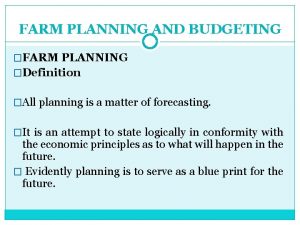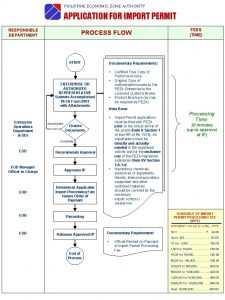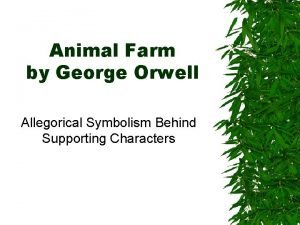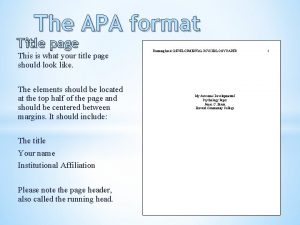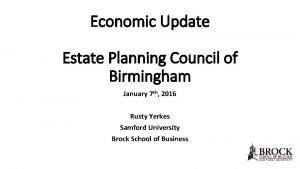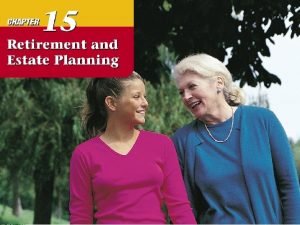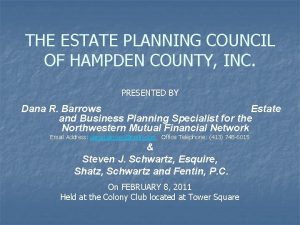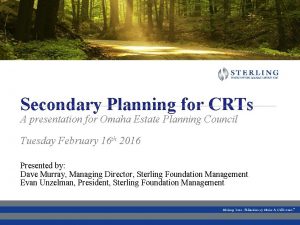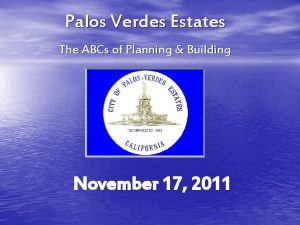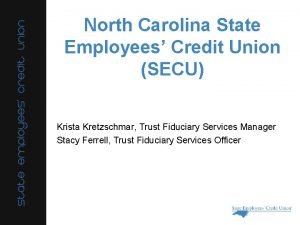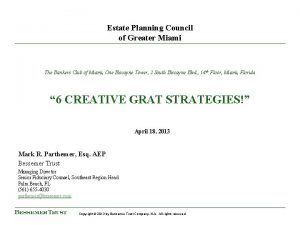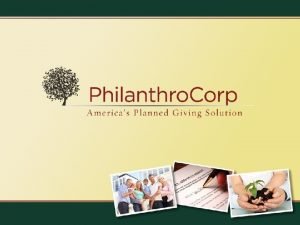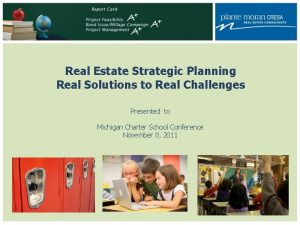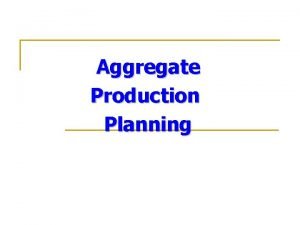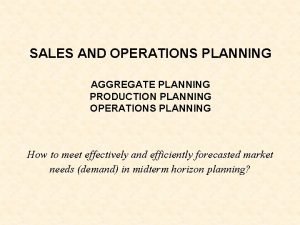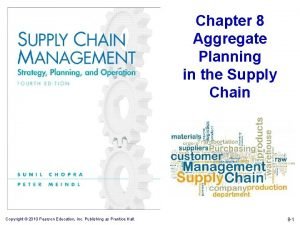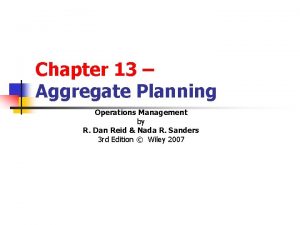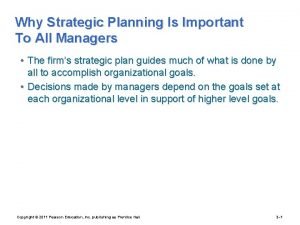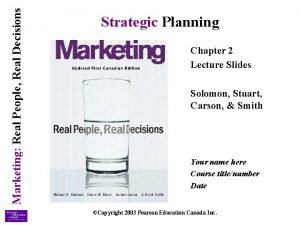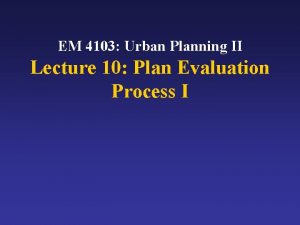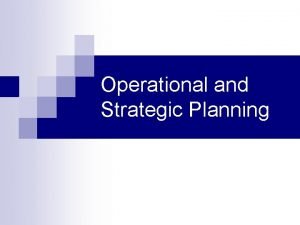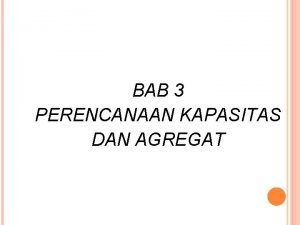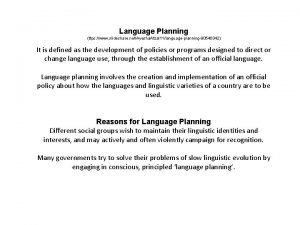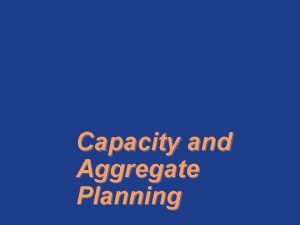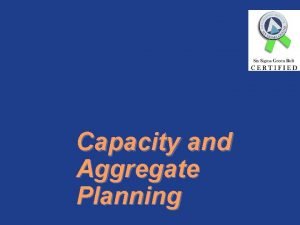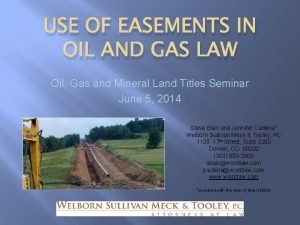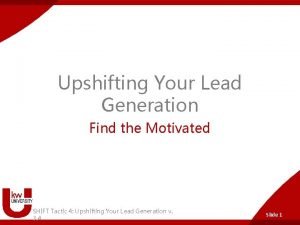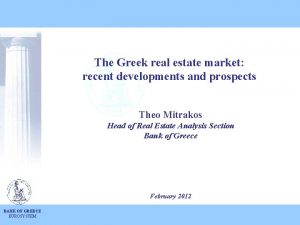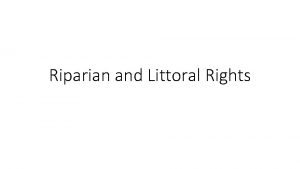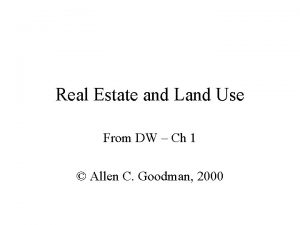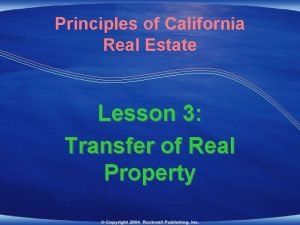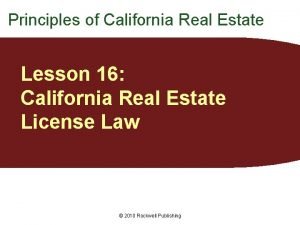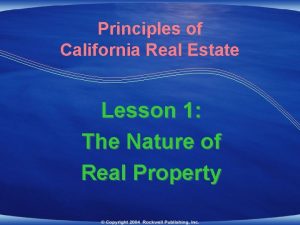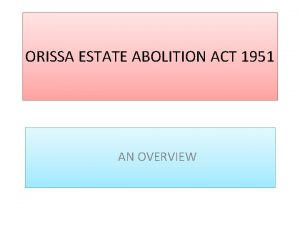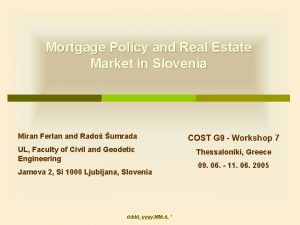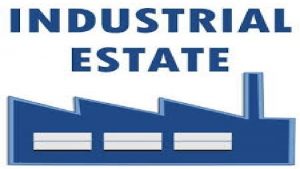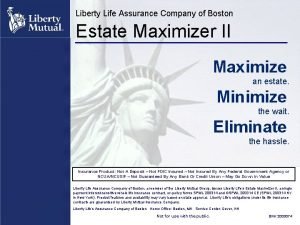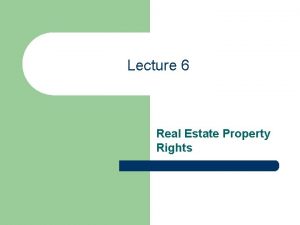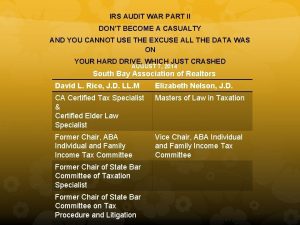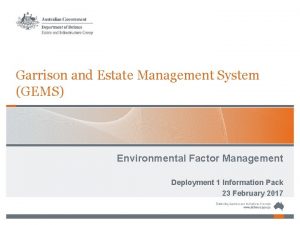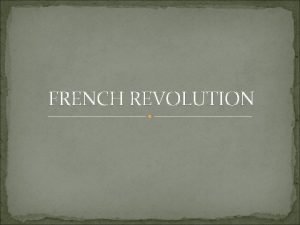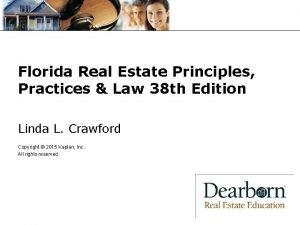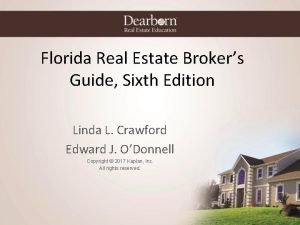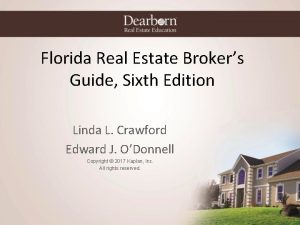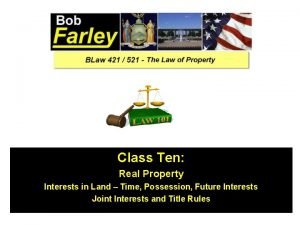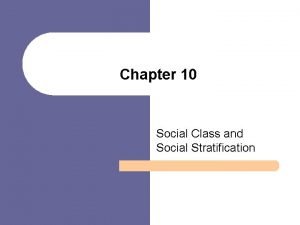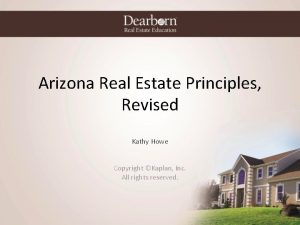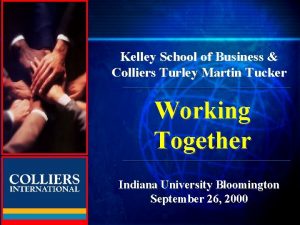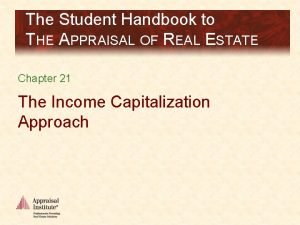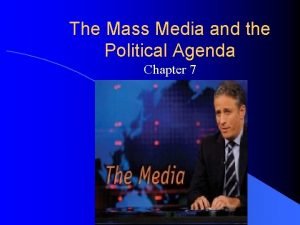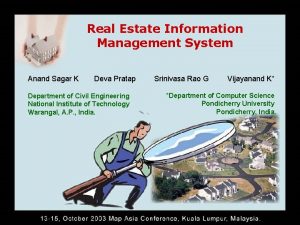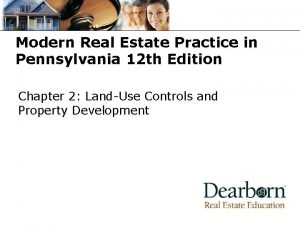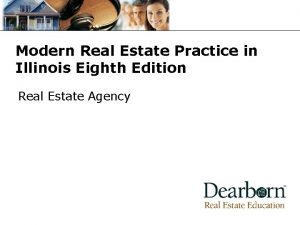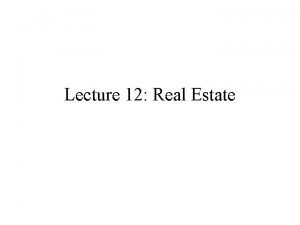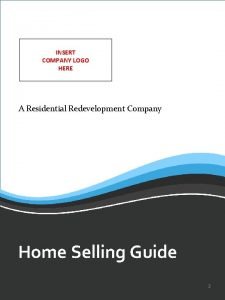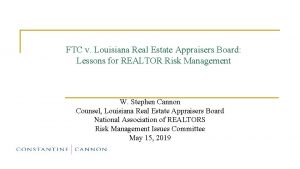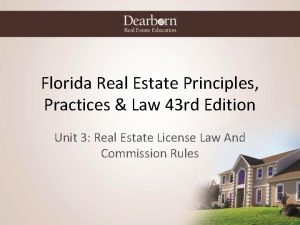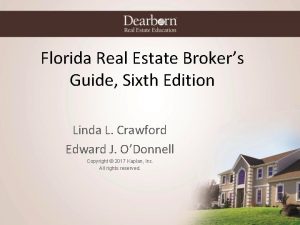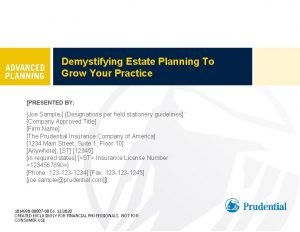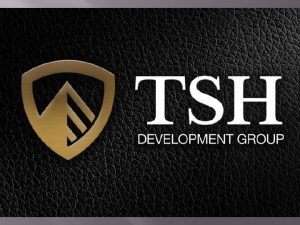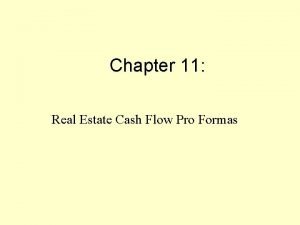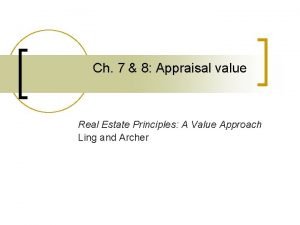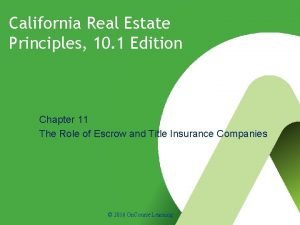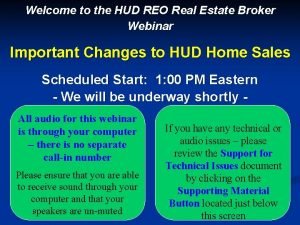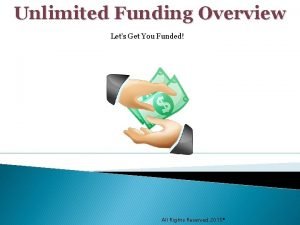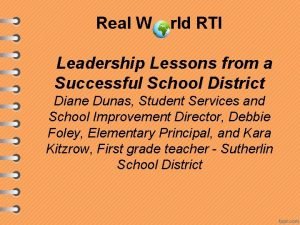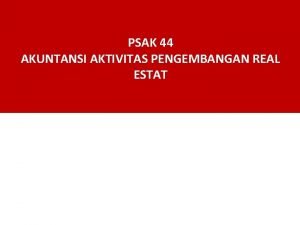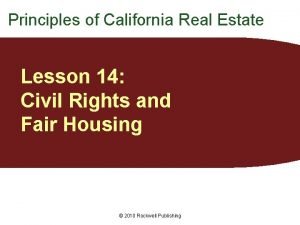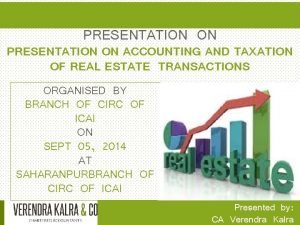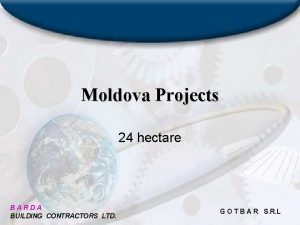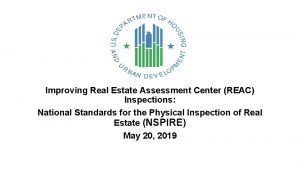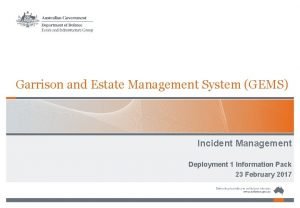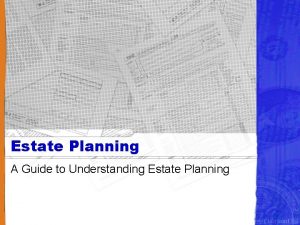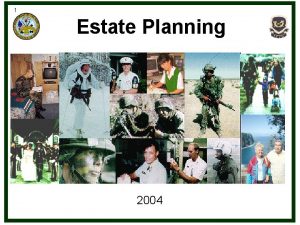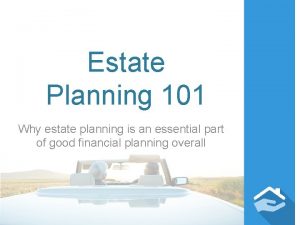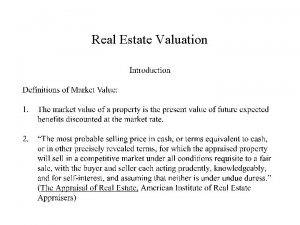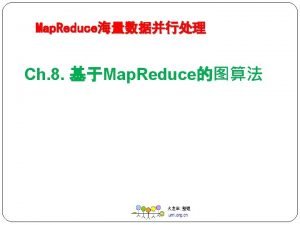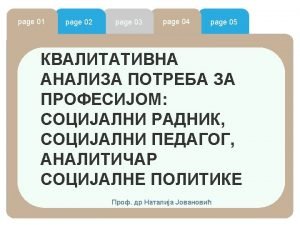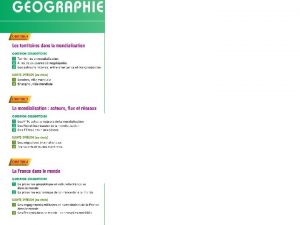Farm Estate Planning Strategies Page 1 of 79
















































































































- Slides: 112

Farm Estate Planning Strategies Page 1 of 79 1

The Need for Estate Planning One of the challenges of Planning is to make people aware that they need to take action. Nowhere is that more of an issue than with the family farm. * Iowa Farm Bureau Page 2 of 79 2

n Why is First Resources Involved? 1. One of the most common methods of paying Estate Taxes is Insurance – We sell insurance. 2. One of the risk factors for farms is Long Term Care – We sell LTC. 3. Investments are a key element in planning – We advise investors. Page 3 of 79 3

n Three Levels of Planning 1. Family Plan 2. Elimination of Tax 3. Management of Asset Cost and Continuity of Business Page 4 of 79 4

n 1. 2. 3. 4. n Level 1 360 Acres @ $3, 000 per acre. Who receives the farm? How do I treat other children? Who will handle the estate? How do I protect the farm from unexpected expenses? Page 5 of 79 5

n Level 2 800 Acres @ $3, 000 per acre. n Design wills/trusts that eliminate tax n How do I treat other children? n Who will handle the estate? n Unexpected expenses? Page 6 of 79 6

n 1. 2. 3. 4. 5. n Level 3 1500 Acres @ $3, 000 per acre Minimize Estate Tax How do I treat other children? Who will handle the estate? Unexpected expenses? Management of Tax Payments? Page 7 of 79 7

The Need for Estate Planning The tendency to listen to politicians in Washington discourages effective action. For 40 years, they have talked about solutions and we still have a tax of 45% for all values over $2, 000. Minnesota tax is imposed for values over $1, 000. Page 8 of 79 8

What is Estate Planning? À Determining goals with respect to your property both during life and at death. Arranging your property to accomplish these goals. Protecting your assets from depletion risks. Page 9 of 79 9

Who Needs Estate Planning? Page 10 of 79 1

Everyone Needs to Plan Their Estate n Property ownership that fits a plan. n Wills that distribute according to your wishes. n Appointment of responsible people to handle the estate. n Reduce or eliminate taxation. n Power of Attorney. Page 11 of 79 1

Property Ownership n n Joint Tenancy Bypass the will Non-probate Reduces stepped up basis Can be fully subject to Medicaid claims n n n Tenancy in Common Proportionate Ownership Does not transfer to other owner at death Can raise questions of % ownership Subject to transfer by will or intestacy rules Probate Page 12 of 79 1

The Need for Estate Planning n Everyone has an estate plan! n If you don’t develop one, the state has one for you. Page 13 of 79 1

State Provided Plan Page 14 of 79 1

State Provided Plan Article I If no children, All to Spouse Page 15 of 79 1

State Provided Plan Article II If children only from marriage of husband wife: n $70, 000 to spouse n ½ of excess to spouse Page 16 of 79 1

State Provided Plan Article III If all children are not from this spouse: n ½ to spouse Page 17 of 79 1

State Provided Plan Article IV Children receive equal shares by right of representation. Page 18 of 79 1

State Provided Plan Article V If a child has pre-deceased the parent without grandchildren, then to parent(s) of child; if not alive, then escheat! Page 19 of 79 1

Election Against The Will Years of Marriage 1 year = 1 -2 = 2 -3 = 3 -4 = 4 -5 = 5 -6 = 6 -7 = 7 -8 = 8 -9 = 9 -10 = 10 -11 = 11 -12 = 12 -13 = 13 -14 = 14 -15 = 15+ = % Share__________ Supplemental Amount ($50, 000) 3 6 9 12 15 18 21 24 27 30 34 38 42 46 50 Page 20 of 79 2

Who Needs Estate Tax Planning? 4, 000 3, 500, 000 3, 000, 000 2, 000 1, 500, 000 1, 000, 000 2005 2006 2007 2008 2009 2010 2011 Page 21 of 79 2

Stepped-up Basis Congress giveth and taketh away! While there is estate tax, the basis of property is “stepped-up” to the value at date of death or 9 months after death (Alternative valuation). If death occurs when there is no estate tax, stepped up basis is limited or eliminated. Page 22 of 79 2

Simple Will Husband’s Estate ($3, 000) Page 23 of 79 2

Simple Will Husband’s Estate ($3, 000) No Federal Estate Tax Wife’s Estate ($3, 000) Page 24 of 79 2

Simple Will Husband’s Estate ($3, 000) Husband’s Death* No Federal Estate Tax Wife’s Estate ($3, 000) Wife’s Death* Wife’s Heirs ($2, 551, 700) Federal Estate Tax $460, 000 * Assumes death in 2006. Page 25 of 79 2

Simple Will n Result • No taxes at first death. • Entire estate is taxed at second death. n Advantages • Transfer of maximum amount of property to spouse outright. • No federal estate tax at first death. n There may be substantial federal estate tax on death of surviving spouse. Page 26 of 79 2

Unified Credit Trust Will Husband’s Estate ($3, 000) Unified Credit (By-Pass) Trust $2, 000 Income Wife No Tax* Husband’s Heirs $2, 000 *Assumes death in 2006 - 2008 Page 27 of 79 2

Unified Credit Trust Will Husband’s Estate ($3, 000) Unified Credit (By-Pass) Trust $2, 000 No Federal Estate Tax Wife’s Estate ($1, 000) No Tax* Husband’s Heirs $2, 000 Page 28 of 79 No Tax* Wife’s Heirs $1, 000 *Assumes death in year 2006. 2

Increased Unified Credit If death occurs in year. . . Amount passing estate tax free 2003 2004 2005 2006 2007 2008 2009 2010 2011 $1, 000 1, 500, 000 2, 000, 000 2, 000 3, 500, 000 Repealed 1, 000 Page 29 of 79 2

Life Insurance Improperly Owned $4 Million Estate Page 30 of 79 3

Life Insurance Improperly Owned $1, 000 of the Estate is Life Insurance Estate Page 31 of 79 3

Life Insurance Improperly Owned Estate without Life 0 Insurance but with a unified credit trust: $0 Taxes Estate Life Insurance With Life Insurance in the Estate: Page 32 of 79 $460, 000 Taxes 3

Life Insurance Properly Owned Individuals Trust Life Insurance Page 33 of 79 $4, 000 Estate $0 Taxes 3

The Need for Estate Planning? Page 34 of 79 3

Financial Burdens n Estate settlement costs are too high • Probate fees • Death taxes • Debts Page 35 of 79 3

Financial Burdens n Estate Settlement costs are too high • Probate fees • Death taxes • Debts n Estate assets are improperly arranged • Liquidity • Cash flow Page 36 of 79 3

Financial Burdens Non-Liquid Assets Page 37 of 79 3

Common Mistakes n No written plan. n Improper ownership of assets. n Life insurance is improperly owned. Page 38 of 79 3

Alwin C. Ernst Estate Gross Estate $12, 642, 431 Page 39 of 79 3

Alwin C. Ernst Estate Debts $1, 014, 314 Page 40 of 79 4

Alwin C. Ernst Estate Debts $1, 014, 314 Admin. Costs $78, 862 Page 41 of 79 4

Alwin C. Ernst Estate Debts $1, 014, 314 Admin. Costs $78, 862 Estate Taxes $ 4, 335, 000 Page 42 of 79 4

Alwin C. Ernst Estate Net to Heirs $6, 571, 548 45% Shrinkage Page 43 of 79 4

Discuss Here the “Estates of 4 Famous People” Handouts Page 44 of 79 4

Advanced Directives The Advanced Directive or “Living Will” is the best method to control medical care when you’ve lost communication n Assign an Agent n Describe your desire for pain relief n Limit medical treatment, if desired Page 45 of 79 4

Power of Attorney n Assign Responsibility and ability to act on your behalf. Page 46 of 79 4

Protecting Assets from Medicaid Page 47 of 79 4

Protecting Assets from Medicaid n The Homestead Rule n Detached Property n Asset Retention Limits n Equipment and Other Business Assets n Income Limitations n Spend-down n Liens Page 48 of 79 4

Protections for the Community Spouse n Community Spouse Resource Allowance (CSRA): – Minimum $28, 001 – Maximum $99, 540 n Increased CSRA: – Permitted, but rarely used. Minnesota follows the income-first rule. n Annuities – Actuarially sound annuities are permitted (but restrictions apply; check with attorney). n Monthly Maintenance Needs Allowance: – Minimum $1, 604. 00 – Maximum $2, 488. 50 Page 49 of 79 4

Transfers n Average monthly cost of nursing home care according to state: $4, 198. 00 Page 50 of 79 5

Income n Is the state an “income cap” state? NO Page 51 of 79 5

Estate Recovery n Has the state expanded the definition of “estate” beyond the probate estate? – No (but exceptions apply; check with attorney) n Has the state included a hardship? – Yes Page 52 of 79 5

Common Estate Planning Strategies Page 53 of 79 5

Common Estate Planning Strategies n n n n Outright Gifts Family Farm Owned Business Deduction Grantor Retained Trusts Charitable Remainders Trusts Irrevocable Insurance Trusts Wait-and-See Trusts Family Limited Partnerships Page 54 of 79 5

Outright Gifts $12, 000 donor/donee Page 55 of 79 5

Outright Gifts Gift tax annual exclusion amount is $12, 000 for gifts made in 2006, and is subject to indexing in the future. Parent Child 1 Child 2 $12, 000/donor/donee Page 56 of 79 5

Gifting Through the Unified Credit Husband - $2, 000 ► Gift to Children Wife - $2, 000 n Requires a gift Tax Return n No Stepped-up basis n Cannot retain control or enjoy the benefit of Gifted property Page 57 of 79 5

Gift Challenges n Estate Growth exceeds tax free gifts n Gift assets may be essential to owners n Gifting the Farm requires restructuring and valuations Page 58 of 79 5

Family Farm Business Deduction If elected, Applies To Estates Prior To 2004 or After 2010 n The deduction is the lesser of the unified credit equivalent or the adjusted value of the business n The business must pass to a qualified heir n The business must be operated by a qualified heir for five of any eight year period in the first 10 years after decedent's death n Many other rules apply Page 59 of 79 5

Common Strategies n n n Outright Gifts Grantor Retained Trusts Charitable Remainder Trusts Irrevocable Insurance Trusts Wait-and-See Trusts Family Limited Partnerships Page 60 of 79 6

Grantor Retained Annuity Trust Parent transfers “REMAINDER INTEREST” in an asset Grantor Parent can RECEIVE INCOME from the asset GRAT Child Page 61 of 79 6

Common Strategies Clearance Sale! 20 - 30 - 40% Off! Page 62 of 79 6

Common Strategies n n n Outright Gifts Grantor Retained Trusts Charitable Remainder Trusts Irrevocable Insurance Trusts Wait-and-See Trusts Family Limited Partnerships Page 63 of 79 6

Charitable Remainder Trusts Assets Donor Charitable Remainder Trust Income Remainder Spouse or Children CHARITY Page 64 of 79 6

Charitable Remainder Trusts & The Wealth Replacement Trust Assets Donor Income from CRT Income Charitable Remainder Trust Remainder Irrevocable Life Insurance Trust Beneficiary Heirs Charity Page 65 of 79 6

Charitable Remainder/Wealth Replacement Results n A sizable gift has been made to donor’s favorite charity. Page 66 of 79 6

Charitable Remainder/Wealth Replacement Results n A sizable gift has been made to donor’s favorite charity. n A current income tax charitable deduction is available for the gift of remainder interest. Page 67 of 79 6

Charitable Remainder/Wealth Replacement Results n A sizable gift has been made to donor’s favorite charity. n A current income tax charitable deduction is available for the gift of remainder interest. n The assets transferred to charity escape estate taxation. Page 68 of 79 6

Charitable Remainder/Wealth Replacement Results n A sizable gift has been made to donor’s favorite charity. n A current income tax charitable deduction is available for the gift of remainder interest. n The assets transferred to charity escape estate taxation. n Donor receives cash flow from CRT (to pay premiums in the wealth replacement trust). Page 69 of 79 6

Charitable Remainder/Wealth Replacement Results n A sizable gift has been made to donor’s favorite charity. n A current income tax charitable deduction is available for the gift of remainder interest. n The assets transferred to charity escape estate taxation. n Donor receives cash flow from CRT (to pay premiums in the wealth replacement trust). n Amount passing to heirs has been preserved. Death proceeds in irrevocable trust provide attractive replacement for assets given to charity. Page 70 of 79 7

Charitable Remainder/Wealth Replacement Results n A sizable gift has been made to donor’s favorite charity. n A current income tax charitable deduction is available for the gift of remainder interest. n The assets transferred to charity escape estate taxation. n Donor receives cash flow from CRT (to pay premiums in the wealth replacement trust). n Amount passing to heirs has been preserved. Death proceeds in irrevocable trust provide attractive replacement for assets given to charity. n Death proceeds are not includible in donor’s estate. Page 71 of 79 7

Common Estate Planning Strategies n n n Outright Gifts Grantor Retained Trusts Charitable Remainder Trusts Irrevocable Insurance Trusts Wait-and-See Trusts Family Limited Partnerships Page 72 of 79 7

Mechanics of Irrevocable Life Insurance Trust n Attorney drafts trust n Client contributes cash to Trustee n Purchase life insurance policy Page 73 of 79 7

How the Irrevocable Insurance Trust Provides Estate Liquidity U. S. Treasury for Estate Taxes Irrevocable Trust Insurance Proceeds $ $ Insurance Policy Assets or Loans C Estate C C C Page 74 of 79 7

Common Estate Planning Strategies n Outright Gifts n Grantor Retained Trusts n Charitable Remainder Trusts n Irrevocable Insurance Trusts n Wait-and-See Trusts n Family Limited Partnerships Page 75 of 79 7

Wait-and-See Trust Today. . . own policy After one spouse dies Policy After Second Death Benefit Cash TRUST Page 76 of 79 7

Common Estate Planning Strategies n Outright Gifts n Grantor Retained Trusts n Charitable Remainder Trusts n Irrevocable Insurance Trusts n Wait-and-See Trusts n Family Limited Partnerships Page 77 of 79 7

Family Limited Partnerships Corporate General Partners Page 78 of 79 7

Family Limited Partnerships Corporate General Partners 1% Family Limited Partnership Page 79 of 79 7

Family Limited Partnerships Corporate General Partners 1% 99% Family Limited Partnership Limited Partners Page 80 of 79 8

Benefits of a FLP n Reduces current income tax liability. n Centralizes ownership of assets. n Shields assets from malpractice & liability claims. n Lowers the value of your taxable estate. n Minimizes probate expenses. n Assets are not publicly displayed. n Flexible, nothing is irrevocable. Page 81 of 79 8

Common Estate Planning Strategies n Outright Gifts n Grantor Retained Trusts n Charitable Remainder Trusts n Irrevocable Insurance Trusts n Wait-and-See Trusts n Family Limited Partnerships Page 82 of 79 8

Valuing the Farm What is the Fair Market Value of a Farm? ”The price at which the property would change hands between a willing buyer and a willing seller, neither being under any compulsion to buy or to sell and both having reasonable knowledge of relevant facts. ” Remember…the reality is that the estate must make a good faith valuation of the property and the IRS can challenge that value. The best method to obtain a value that will withstand scrutiny is to hire a competent appraiser Page 83 of 79 8

Three Common Methods of Valuation 1. Market Data – An arms length sale of the property being valued, or if available, comparable values. Page 84 of 79 8

2. Capitalization of Income – The projected net income of the property from the highest and best use of the property capitalized at a rate that reflects a fair return on this investment. Page 85 of 79 8

3. Redemption Cost – An estimate of the cost of replacing a structure combined with an appraisal of the land. Page 86 of 79 8

Alternative Valuation The highest and best use provision is eliminated and the property is valued as a farm under section 2032(a) of the Internal Revenue Code. Page 87 of 79 8

1. Must be elected. 2. The owner must be a citizen or resident of the U. S. 3. Cannot reduce the value by more than $840, 000 (2003). 4. Must have been farmed for 5 of the last 8 years (retirement or disability exceptions). Page 88 of 79 8

5. 50% of the adjusted gross estate consists of farm that was passed to a qualified heir. 6. 25% of the adjusted gross estate is farm real property. 7. Must continue to be operated as a farm for 10 years. Page 89 of 79 8

The most commonly used method of valuation under this provision is the cash rental approach: Annual Gross Cash Rental, minus Property Tax, all divided by the Federal Land Bank Loan Rate Page 90 of 79 9

How You Can Help! n Estate inventory Page 91 of 79 9

Creating a Transition Plan 1. Establish a process – Meet with the owners to lay the foundation of the process. Which advisors will be used? Who is in the first meeting? (Usually just the owners and a primary advisor) Page 92 of 79 9

2. Establish Goals. What must be done to effectively transfer the business. What are their security needs now and in retirement? Do they have an intended buyer or someone who will receive the farm? Page 93 of 79 9

3. What are the impediments to reaching these goals? Is there an equality issue? What would disability do to the plan? How do they execute the plan with the least tax and legal cost? Page 94 of 79 9

Establishing the Process – The first meeting. n Who do you want the farm to go to? n When do you plan to transfer the farm? n What is the value of the farm? n What terms do you want for the sale or other transfer of the farm? Page 95 of 79 9

n What are your retirement goals? n Is the farm the only source of income? n Have you diversified the risk of having adequate funds for retirement? Page 96 of 79 9

n If the children will not be receiving or keeping the farm, do you have a potential buyer? Do you want a full buy-out or will you carry a note on the property? n Are you willing to rent the farm for some period of time? n Will you consider a reverse mortgage? Page 97 of 79 9

n Who do you want in the next meeting? n What do you want to accomplish (e. g. determine if children want the farm, when, and under what terms). n Have you discussed this topic with the children to determine their interest and issues? What is your plan to ensure harmony, if possible? Page 98 of 79 9

The process should end with wills, advanced directives, Power of Attorney, insurance, and agreements for purchase if appropriate. Page 99 of 79 9

The Second Meeting… n A family meeting n Communication, Communication n Review discussions of first meetings n Focus on results n Design the family goals Page 100 of 79 1

Goals List the most important goals for the family. The following are examples… Page 101 of 79 1

1. Establish the who and how of transition of the farm. 2. Determine which children, if any, have an interest in working the farm. 3. Discuss and plan for equality of treatment between family members. 4. Establish a retirement plan, and a method of funding it. Page 102 of 79 1

5. Account for events that can deter the plan and implement methods of dealing with those risks. 6. Establish wills and advanced directives and Power of Attorney. 7. Execute any documents that are needed to implement the plan. Page 103 of 79 1

Risk Reduction There are risks to any transition plan: üDisability üNursing Home Costs üChange Page 104 of 79 1

Disability A severe disability can significantly reduce income causing acceleration of transfer or general dissolution of the plan. – Rental Income – Social Security Disability – Private Disability Plans – Outside Income Group Plans – Retirement Plans Page 105 of 79 1

Nursing Home Costs n Rental Income n Retirement Income n Long Term Care Insurance Page 106 of 79 1

Dealing with Transition The best laid plans often go astray. Never has this been truer than with farm transition planning. Page 107 of 79 1

1. It must be updated periodically. 2. It requires an impetus at time of implementation. (Who’s in charge of starting the transition) 3. The owners must deal with the emotional issues of change. (The Hero’s Farewell by Jeffrey A. Sonnenfeld). Page 108 of 79 1

Final Tips n Volunteer to be the quarterback. n Start Now n Communicate openly with family members about the transition goals and plan. Page 109 of 79 1

n Establish a vision and execute the documents to enable it to happen. n Deal with family equity. n Select advisors and empower them to do their job. Page 110 of 79 1

n Build a plan that makes you feel comfortable, and makes your family members feel they are being heard. n Implement the tools that you feel are necessary to reduce the risks in the plan. n Review the plan regularly. Page 111 of 79 1

Thank You! Thank you for attending today. Please fill out the evaluation form. Page 112 of 79 1
 Farm planning definition
Farm planning definition Peza form 8106 sample
Peza form 8106 sample Harmouns
Harmouns Who does mollie represent in animal farm
Who does mollie represent in animal farm Header in apa format
Header in apa format Estate planning council of birmingham
Estate planning council of birmingham Chapter 15 retirement and estate planning
Chapter 15 retirement and estate planning Family limited partnership
Family limited partnership Grat trust
Grat trust Omaha estate planning council
Omaha estate planning council Estate planning palos verdes peninsula
Estate planning palos verdes peninsula Ncsecu estate planning
Ncsecu estate planning Chicago estate planning council
Chicago estate planning council Resident alien telluride
Resident alien telluride Bankers club miami
Bankers club miami Ministry estate planning
Ministry estate planning Strategic planning real estate
Strategic planning real estate Advantages and disadvantages of aggregate
Advantages and disadvantages of aggregate Sales and operations planning
Sales and operations planning Aggregate planning solved examples
Aggregate planning solved examples Aggregate planning in operations management
Aggregate planning in operations management Disaggregating the aggregate plan
Disaggregating the aggregate plan Why strategic planning is important to all managers?
Why strategic planning is important to all managers? Strategic planning vs tactical planning
Strategic planning vs tactical planning Planning balance sheet in urban planning
Planning balance sheet in urban planning Role segmentation workforce planning
Role segmentation workforce planning Inactivism planning
Inactivism planning Perencanaan agregat ppt
Perencanaan agregat ppt Short term planning and long term planning
Short term planning and long term planning Stages of language planning slideshare
Stages of language planning slideshare List the strategic objectives of aggregate planning
List the strategic objectives of aggregate planning Capacity aggregation example
Capacity aggregation example 60 second elevator pitch
60 second elevator pitch Dominant and servient easements
Dominant and servient easements Mofir real estate
Mofir real estate Reserving a life estate
Reserving a life estate Real estate stakeholders
Real estate stakeholders Greek real estate market
Greek real estate market What was the reason for the french revolution
What was the reason for the french revolution Non possessory estate
Non possessory estate Sandy miller realtor
Sandy miller realtor Littoral rights vs riparian rights
Littoral rights vs riparian rights Second estate definition
Second estate definition What are the 4 types of real estate
What are the 4 types of real estate Fundamentals of analyzing real estate investments download
Fundamentals of analyzing real estate investments download Strategicerp-real estate erp software
Strategicerp-real estate erp software Real estate four quadrant model
Real estate four quadrant model Involuntary alienation real estate
Involuntary alienation real estate Blind ad real estate
Blind ad real estate Emblements real estate
Emblements real estate Panama real estate law
Panama real estate law Oea act
Oea act Main cause of french revolution
Main cause of french revolution Encumbered real estate
Encumbered real estate What is industrial estates
What is industrial estates Estate maximizer liberty mutual
Estate maximizer liberty mutual Dominant vs servient estate
Dominant vs servient estate Irs audit real estate professional
Irs audit real estate professional Immobility real estate
Immobility real estate What is industrial estates
What is industrial estates Garrison estate management system
Garrison estate management system How was the society divided before the french revolution
How was the society divided before the french revolution Florida real estate principles practices and law download
Florida real estate principles practices and law download Florida real estate broker's guide
Florida real estate broker's guide Florida real estate broker's guide 6th edition
Florida real estate broker's guide 6th edition Rule against perpetuities
Rule against perpetuities Social stratification
Social stratification What is space market in real estate
What is space market in real estate Erp for real estate developers
Erp for real estate developers Arizona real estate law book
Arizona real estate law book Millionaire real estate investor worksheets
Millionaire real estate investor worksheets Real estate buyers packet
Real estate buyers packet Tucker kelley
Tucker kelley The student handbook to the appraisal of real estate
The student handbook to the appraisal of real estate Fourth estate meaning
Fourth estate meaning French revolution political cartoon assignment
French revolution political cartoon assignment Walmart didirikan
Walmart didirikan Real estate information management
Real estate information management Urban economics and real estate markets
Urban economics and real estate markets Multi level marketing real estate
Multi level marketing real estate Modern real estate practice in pennsylvania 14th edition
Modern real estate practice in pennsylvania 14th edition Modern real estate practice in illinois
Modern real estate practice in illinois Real estate lecture
Real estate lecture The ivory land estate
The ivory land estate Thanandpaul.com real estate
Thanandpaul.com real estate La real estate appraisers board
La real estate appraisers board Free real estate presentation templates
Free real estate presentation templates Involuntary inactive real estate license florida
Involuntary inactive real estate license florida Florida real estate broker's guide
Florida real estate broker's guide Denver real estate investment associations
Denver real estate investment associations Epic estate plans
Epic estate plans Real estate development proposal presentation
Real estate development proposal presentation Pro forma real estate
Pro forma real estate Principles of value in real estate
Principles of value in real estate Easton v strassburger
Easton v strassburger Closing statements real estate
Closing statements real estate Bhubaneswar real estate market
Bhubaneswar real estate market Npn real estate
Npn real estate Hud reo
Hud reo Unlimited funding for real estate
Unlimited funding for real estate Seizen real estate
Seizen real estate Dnb rre
Dnb rre Rti meaning real estate
Rti meaning real estate Psak 44 real estate
Psak 44 real estate Ebrd real estate
Ebrd real estate Unruh civil rights act real estate
Unruh civil rights act real estate Guidance note on accounting for real estate transactions
Guidance note on accounting for real estate transactions Moldova real estate market
Moldova real estate market Alpine commercial broker
Alpine commercial broker Dan duffy united real estate
Dan duffy united real estate Nspire reac
Nspire reac Hartel commercial real estate
Hartel commercial real estate Gems estate management
Gems estate management
